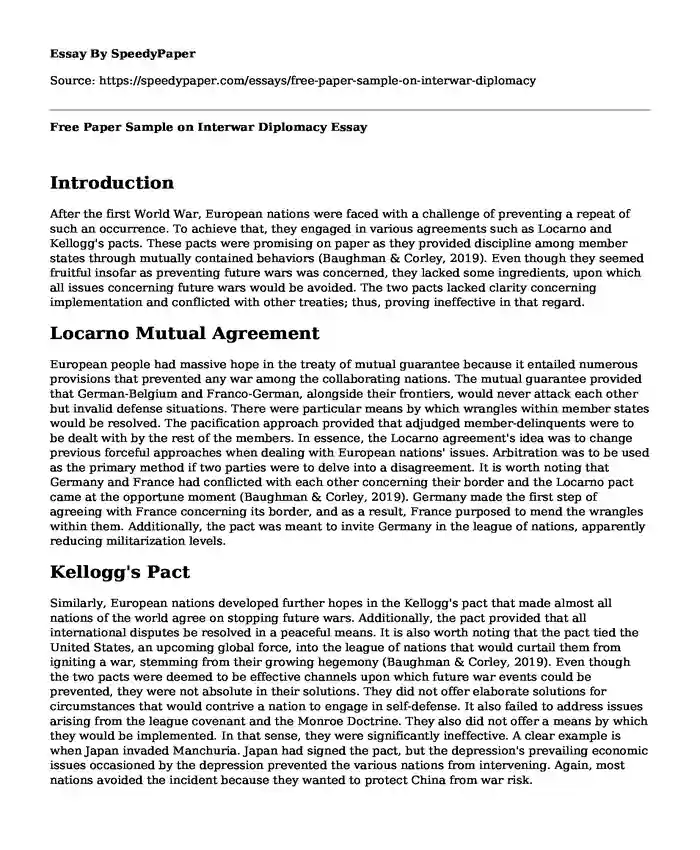
| Type of paper: | Essay |
| Categories: | Politics Political science World War 1 |
| Pages: | 3 |
| Wordcount: | 600 words |
Introduction
After the first World War, European nations were faced with a challenge of preventing a repeat of such an occurrence. To achieve that, they engaged in various agreements such as Locarno and Kellogg's pacts. These pacts were promising on paper as they provided discipline among member states through mutually contained behaviors (Baughman & Corley, 2019). Even though they seemed fruitful insofar as preventing future wars was concerned, they lacked some ingredients, upon which all issues concerning future wars would be avoided. The two pacts lacked clarity concerning implementation and conflicted with other treaties; thus, proving ineffective in that regard.
Locarno Mutual Agreement
European people had massive hope in the treaty of mutual guarantee because it entailed numerous provisions that prevented any war among the collaborating nations. The mutual guarantee provided that German-Belgium and Franco-German, alongside their frontiers, would never attack each other but invalid defense situations. There were particular means by which wrangles within member states would be resolved. The pacification approach provided that adjudged member-delinquents were to be dealt with by the rest of the members. In essence, the Locarno agreement's idea was to change previous forceful approaches when dealing with European nations' issues. Arbitration was to be used as the primary method if two parties were to delve into a disagreement. It is worth noting that Germany and France had conflicted with each other concerning their border and the Locarno pact came at the opportune moment (Baughman & Corley, 2019). Germany made the first step of agreeing with France concerning its border, and as a result, France purposed to mend the wrangles within them. Additionally, the pact was meant to invite Germany in the league of nations, apparently reducing militarization levels.
Kellogg's Pact
Similarly, European nations developed further hopes in the Kellogg's pact that made almost all nations of the world agree on stopping future wars. Additionally, the pact provided that all international disputes be resolved in a peaceful means. It is also worth noting that the pact tied the United States, an upcoming global force, into the league of nations that would curtail them from igniting a war, stemming from their growing hegemony (Baughman & Corley, 2019). Even though the two pacts were deemed to be effective channels upon which future war events could be prevented, they were not absolute in their solutions. They did not offer elaborate solutions for circumstances that would contrive a nation to engage in self-defense. It also failed to address issues arising from the league covenant and the Monroe Doctrine. They also did not offer a means by which they would be implemented. In that sense, they were significantly ineffective. A clear example is when Japan invaded Manchuria. Japan had signed the pact, but the depression's prevailing economic issues occasioned by the depression prevented the various nations from intervening. Again, most nations avoided the incident because they wanted to protect China from war risk.
Conclusion
Treaties were part and parcel of conceptualized solutions upon which European nations relied on preventing future wars after the first World War. On paper, they seemed effective from the sense that each member was barred from igniting war. They also brought influential forces such as the United States and Germany together, hoping that militarization levels would drop. Even though they seemed to work in some cases, they were ineffective because they did not offer clear implementation strategies and conflicted with other pacts before them. The Pacts failed to work, probably because they provided solutions, only considering the First World War events.
Reference
Baughman, T.H. & Corley, J.L. (2019, August 29). World Civilization Essentials. Kindle Edition. https://www.amazon.com/World-Civilization-Essentials-T-H-Baughman-ebook/dp/B07X82CNS5.
Cite this page
Free Paper Sample on Interwar Diplomacy. (2024, Jan 01). Retrieved from https://speedypaper.net/essays/free-paper-sample-on-interwar-diplomacy
Request Removal
If you are the original author of this essay and no longer wish to have it published on the SpeedyPaper website, please click below to request its removal:
- Essay Example on the Future of the English Language
- Free Essay on the Books Government Is Us and The New Public Service: Servicing, Not Steering
- Essay Sample on Situation Analysis of Polaris
- Helping Older People. Paper Example
- Paper Example. Immigration Into the United States
- Understanding the Value of Qualitative Research - Essay Example
- Essay Sample on Ethnographer/Own Experience
Popular categories




